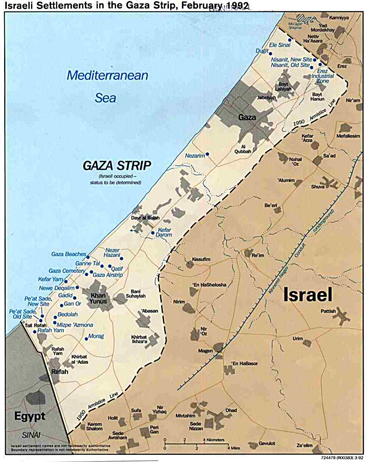The responsibilities can surely be shared in the Israeli slaughter of innocents during the Christmas-Hanukkah-New-Year firestorm in Gaza. Of course the Israeli government, supported by a population fanaticized by fear and Zionist ideology, is primarily responsible. Not because the rockets and suicide bombings used by the Hamas authorities are of minor importance, but because the Israeli authorities have done everything possible not to establish the foundations of mutual accommodation.
The dream of peace seemingly made concrete by the Oslo Agreements of 1993 quickly became, if it was not initially, a stratagem designed to avoid a lasting settlement of different claims through compromise. Although it can be argued that the assassination of Yitzhak Rabin in late 1995 “derailed” the “peace process”, it is impossible to say that the event actually changed the course of history. Although the effects of such assassinations should not be minimized, they can also be understood as logical if the fallen leader is perceived as an obstacle to overriding interests and aspirations.
The real question is whether the colonization of the West Bank would have stopped if he had lived. Rabin made declarations suggesting that the development of settlements would be curtailed, but he also continued to finance them. His declarations are considered by many observers to have been insincere.
The principle support for this assertion is in the continued colonization, by the establishment of Israeli housing communities in the West Bank and the continued confiscation of Palestinian land and massive destruction of Palestinian homes during this period of the mid-1990s. In addition, the division of the West Bank into different administrative zones in September 1995, all of which remained under Israeli control (“Oslo II”), and the continued construction of by-pass roads for the settlers indicate that the creation of a contiguous Palestinian state in the West Bank was not envisioned.
The Israeli state’s initial cultivation of the Hamas organization was part of this strategy. This was because of its potential to, firstly, split the Palestinian resistance movement by favoring a Muslim fundamentalist political entity with the idea of weakening the most radical and influential components of the Palestine Liberation Organization : Fatah, the Popular Front for the Liberation of Palestine and the Democratic Front for the Liberation of Palestine. Secondly, once the resistance was effectively weakened, and especially once the Palestinian Authority was created by the militaristic leaders of the PLO returned from exile under the command of Yasser Arafat, Israeli obstruction in the application of the Oslo Agreements contributed to the popularity of Hamas. `
The Islamic organization picked up the standard of popular resistance by providing needed social services and by using the tactic of direct action in the form of suicide bombings. “After all,” moderate people began to say in the occupied territories and elsewhere, “how can you fight back if no other weapons are available, and when the world is largely indifferent to Israeli oppression ?”
However, what was really new was the principle of armed struggle, as opposed to the non-violent tactics (excluding the throwing of stones by children and adolescents) of the first Intifada (1987-1993). The military cadres and police forces of the Palestine Authority contributed to the militarization of the population. But Hamas was in the best position to incorporate it into the resistance struggle.
For the Zionist authorities, creating the conditions for some form of civil strife in Palestine was essential. The electoral majority obtained by Hamas in January, 2006, a consequence of popular disgust over the corruption and lack of firmness of the Fatah-dominated Palestine National Authority, set the stage for the evacuation of Gaza — where Hamas was most powerful — and the split of the occupied territories when political factionalism between Fatah and Hamas was resolved through armed struggle. At that point, a Hamas-dominated Gaza became the most beneficial asset for the yet-unfinished Zionist project (that of continuing the long-term effort to ethnically cleanse “Greater Israel”).
The contradiction embodied by Hamas is that, on the one hand, like Hezbollah in Lebanon, it does indeed present the most convincing opposition to the brutalities and the designs of the Israeli authorities. Who can deny the appeal of those who are willing to fight back, who save the honor of the population and seemingly protect it from enemies who have treated the Palestinians like sub-humans for decades ?
On the other hand, the problem is that Hamas is Israel’s most perfect enemy. Like Al Qaeda for recent governments of the United States, if Hamas did not exist, it would have been necessary to invent it. Hamas provides the perfect pretext for punishing the Palestinian people and denying the only possible solution to the “spiral of violence”.
Until the Palestinians enjoy some sort of real political autonomy and economic self-sufficiency they have no choice but to resist Israeli occupation. But achieving these goals is unacceptable for Israeli decision makers. It means either the transformation of Israel and the Occupied Territories into one multi-ethnic and multi-confessional (thus, secular) state or the creation of a Palestinian state within the general boundaries existing before June 1967. When we understand that most of the water consumed in Israel comes from the West Bank, we realize the difficulty in arriving at such arrangements.
However, the Zionist project in Israel — the consolidation of an exclusionary Jewish state in all of historical Palestine — cannot be achieved without support from the Western industrialized countries and especially the United States. Here, the responsibility for the present situation is undeniable and overwhelming.
First, Great Britain has a major responsibility. In order to preserve its predominance in the Eastern Mediterranean it obtained a “mandate” to administer the most valuable portion of the former Turkish Empire : that allowing control over the approaches (Palestine) to the Suez Canal, and that allowing access to the all-important petroleum reserves in the regions of today’s Iraq and Iran. Let us not forget that the conflict between Germany and Great Britain before the First World War was over access to “Turkish” oil reserves.
But why did the British government accept the principle of allowing massive Jewish immigration into Palestine, thus complicating its administration of Palestine ? The answer is that British authorities did not regard increased Jewish presence as a problem, but rather as a solution. Some British officials had Zionist sympathies, but others had a more pragmatic perspective. As Sir Ronald Storrs, the first British military governor of Jerusalem, said in his memoirs years later, the Zionist enterprise was “one that blessed him that gave as well as him that took, by forming for England ‘a little loyal Jewish Ulster’ in a sea of potentially hostile Arabism.” What had worked so well in Ireland (and in India with the Muslim minority), would surely apply to Palestine.
That Britain’s clever strategy blew up in its face does not change the motivation. After all, other imperialist countries have also made major miscalculations of the sort. The problem is that the populations of the dominated and exploited regions pay the price.
The foundations of US responsibility in this affair really began during the Second World War. Franklin Roosevelt announced to Winston Churchill that the European countries, including Britain, would be called upon to abandon their colonial empires after the War. In 1944, Britain agreed to allow US oil companies to compete with British Petroleum in the Middle East, in return for the famous “British Loan” of 1946 and then Marshall Plan assistance after 1947. The Truman administration then short-circuited anti-trust laws to allow creation of ARAMCO (Arab-American Oil Company).
In 1953, the powerful US secretary of state, John Foster Dulles, toured the Middle East, after which he concluded that the key to stability in the region was the formation of some sort of strategic alliance with some of the Middle-Eastern countries, especially Egypt. This project was unsuccessful, and by the end of the 1950s Israel began to be seen as a potential spoiler in the region, especially after its attack on Egypt in 1956. Military aid from the US began to arrive. Israel again showed its mettle in June 1967 by simultaneously defeating Egypt, Syria and Jordan.
US aid to Israel then quickly rose to the over $3 billion that it has been officially each year since the early 1970s (in addition to much more in the form of grants, “loan guarantees” and other benefits). In 1978, Jimmy Carter achieved John Foster Dulles’ ambition of separating Egypt from the other Arabic states in the region. His celebrated Camp David Agreements, touted as a great step towards peace, in fact gave Israel a freer hand in attacking neighboring countries, and in accelerating the colonization of the Palestinian territories occupied in 1967. The Egyptian government began to receive approximately $2 billion in annual US aid. It is the second most favored recipient of US largesse.
US responsibility in the continued occupation and oppression of the Palestinians has certainly not diminished in recent years. Even after the first war against Iraq in 1991, and then the dissolution of the Soviet Union as chief competitor in the region, each succeeding US government has supported Israel without reservation. Even now that the US has its own military bases throughout the Middle East and Central Asia, Israel remains an important bulwark in the US diplomatic and military arsenal. As in the case of Iran today, Israel is a weapon whose importance can be measured by the fear that its bellicosity and supposed independence inspires. This state that has no reason to abide by international law, that has never even claimed to respect international law, is a sort of useful pit bull that US officials assert cannot be controlled. But this is too convenient.
The truth of the matter is very different. Israel can be controlled because it is largely dependant upon the United States for much of its weaponry and for its financial solvency. Remove this support, and the state of Israel will be quickly constrained to negotiate with the Palestinians and with its neighbors. Most importantly, the dismantling of Israeli settlements in the occupied territories, and arranging that Jerusalem be jointly administered, would undercut Hamas and strengthen the will of secular political representatives like Mahmoud Abbas.
Some day, hopefully soon, we will see that the admittedly powerful Zionist (or “Jewish”) lobby (AIPAC) in the United States is also a paper tiger. The members of Congress who are so cowed by it today will change quickly when events show that it is not in the interest of the United States or of anyone else, including Israel citizens, that Israel persist in its colonial and racist policies. Popular opinion and political will are fickle things.
If others and myself have recognized there are cultural affinities between United-Statesians and Israelis that must be taken into account when explaining their “special relationship” (see Counterpunch February 24-25, 2007), they should not be seen as determining factors. Zionism is a powerful ideological force, but it is subject to shifting perceptions of political interest. Israel has been able to influence politicians and governments in the United States, but changing economic and geopolitical imperatives will soon weaken its capacity to do this.
The responsibilities for the war crimes committed by Israel, with the complicity of the United States and the European states, are clear, and they should never be forgotten. The suffering of the Palestinian population, and so many others, cannot be justified in any way but, as in the cases of Guernica, Warsaw, Grozny, Jenin and Falluja, they will inspire generations of people to fight against stupidity and injustice.



